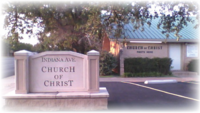The Churches of Christ (non-institutional)
| Churches of Christ (non-institutional) | |
|---|---|

a (non-institutional) church of Christ building in Lubbock, Texas
|
|
| Classification | Christian |
| Orientation | New Testament |
| Polity | Congregationalist |
| Separations | Disciples of Christ, Church of Christ, Christian Church |
The label "non-institutional" refers to a distinct fellowship within the Churches of Christ who do not agree with the support of parachurch organizations (colleges, orphans' homes, organized mission efforts, etc.) by local congregations. They contend that the New Testament includes no authority for churches' support of such institutions. Instead they feel that it is a responsibility and duty of the individual to assist those in need. These local churches became separated from "mainline" (pro-institutional) churches of Christ because of these viewpoints, developing into a distinct segment of congregations by the 1960s. Whether a congregation supports the "sponsoring church" custom is one way to distinguish between the "non-institutional" and "mainstream" congregations. The congregations that advocate financial support or the pooling of resources for the benefit of other entities or organized external evangelical efforts are sometimes called "sponsoring churches" and identified as "mainstream."
This fellowship of non-institutional congregations, which intentionally forgoes any para-congregational organizational structure, is estimated at about 120,000 members, accounting for around 9% of the members of Churches of Christ in the United States and for about 15% of congregations. The degree to which members of a congregation associate and interact with members of other Churches of Christ varies greatly by area, from none at all to a considerable degree. Its preachers are trained in a variety of ways. Some study at Florida College, which has no formal ties to any church, and a faculty and student body who are largely associated with the non-institutional churches of Christ. Most of the preachers are mentored by a more experienced preacher or may be self-trained. No formal degree requirements are needed for an individual to be employed as a preacher in the churches of Christ.
These congregations generally accept the description "non-institutional", although they do not officially identify as such on signs, letterhead, or other official documents; they reject the epithet "anti" with which they were labeled by some in the larger mainstream Churches of Christ in the 1950s and 1960s, and likewise the similar term, "non-cooperation movement". They identify as part of the original church started by Christ. The 19th century Restoration Movement resulted in an increase in the number of U.S. members.
...
Wikipedia
